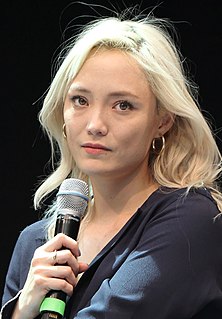A Quote by Pom Klementieff
My mother is schizophrenic. I would love to be brave enough to learn more about it. I try to understand her, I try to be positive about it. She can be so absent and tired by her medication; sometimes she's so lucid, funny, and smart.
Related Quotes
She'd assumed she'd be married and have kids by this age, that she would be grooming her own daughter for this, as her friends were doing. She wanted it so much she would dream about it sometimes, and then she would wake up with the skin at her wrists and neck red from the scratchy lace of the wedding gown she'd dreamed of wearing. But she'd never felt anything for the men she'd dated, nothing beyond her own desperation. And her desire to marry wasn't strong enough, would never be strong enough, to allow her to marry a man she didn't love.
For me, glamour was always an escape. When I was a kid, my mother was hospitalized, she was schizophrenic. When she was sick, she wouldn't do her hair or her makeup, and she just looked terrible. But when she got on medication and she was happy, she would go to the beauty parlor and wear makeup. So I really associate glamour with being happy. If you put on high heels and lipstick or get a new outfit, you feel great. It's a celebration of loving yourself, and the whole ritual of it is so great.
She believes in love and romance. She believes her life is one day going to be transformed into something wonderful and exciting. She has hopes and fears and worries, just like anyone. Sometimes she feels frightened. Sometimes she feels unloved. Sometimes she feels she will never gain approval from those people who are most important to her. But she’s brave and good-hearted and faces her life head-on.
It's remarkable she [Venus Williams] plays at all, given her Sjögren's syndrome [an autoimmune disorder that can cause joint pain]. She's back, winning tournaments. She didn't allow society to tell her, "You have this disease; you can't do that anymore." I look at her, like, "She's not playing at 100 percent. You are. You don't have excuses." Knowing what she went through helped me try to be a more positive person.
I mean, her father was an alcoholic, and her mother was the suffering wife of a man who she could never predict what he would do, where he would be, who he would be. And it's sort of interesting because Eleanor Roosevelt never writes about her mother's agony. She only writes about her father's agony. But her whole life is dedicated to making it better for people in the kind of need and pain and anguish that her mother was in.
Jules has always been one of those women that men go crazy about because she has enough self-confidence to say this is me, take it or leave it. And, invariably, they take it. Or at least try to. They love the fact that she doesn’t wear makeup. That her clothes, on her tiny, petite frame, are a mishmash of whatever she happens to pull out of the wardrobe that morning. That her laugh is huge and infectious, and, most of all, that she listens. She loves life, and people, and makes time for them, and even before Jamie came along men were forever falling in love with her.
My mother hid the struggle from us children. She complained about her salary, and she had a tough time. Although she became a headmistress, she still had to do a lot of sewing. The more I think about her, the more remarkable I realise she was. And she understood straight away when I said that I wanted to write.
Sometimes she wished for someone she could tell about her problems, just to be able to say, ‘I’m in love with a man and I can’t have him.’ But that would only lead to questions she couldn’t answer, so she kept the secret and the pain inside, hoping someday she would no longer feel as if half of her were missing.
He knew why he wanted to kiss her. Because she was beautiful. And before that, because she was kind. And before that, because she was smart and funny. Because she was exactly the right kind of smart and funny. Because he could imagine taking a long trip with her without ever getting bored. Because whenever he saw something new and interesting, or new and ridiculous, he always wondered what she'd have to say about it--how many stars she'd give it and why.
What else? She is so beautiful. You don’t get tired of looking at her. You never worry if she is smarter than you: You know she is. She is funny without ever being mean. I love her. I am so lucky to love her, Van Houten. You don’t get to choose if you get hurt in this world, old man, but you do have some say in who hurts you. I like my choices. I hope she likes hers.
So you got rid of your astonishment that someone could write so much more dynamically than you. You stopped cherishing your aloneness and poetic differentness to your delicately flat little bosom. You said: she's to good to forget. How about making her a friend and competitor — you could learn alot from her. So you'll try. So maybe she'll laugh in your face. So maybe she'll beat you hollow in the end. So anyhow, you'll try, and maybe, possibly, she can stand you. Here's hoping!
One thing about my mother is that she has her taste: She knows what she likes and what looks good. It's not studied. There is no insecurity in what she is going to wear, and I think that translates into effortlessness. Her career has been a steady rise, and it hasn't been about the fashion of the moment. It's been because she has kept to her style. She didn't go grunge when it was grunge, or 70's when it was 70's. It's about being secure with what you like and not worrying about what's in fashion that particular day. That's what I admire about her.
As he was about to leave, she said, "Murtagh." He paused and turned to regard her. She hesitated for a moment, then mustered her courage and said, "Why?" She though he understood her meaning: Why her? Why save her, and now why try to rescue her? She had guessed at the answer, but she wanted to hear him say it. He stared at her for the longest while, and then, in a low, hard voice, he said, "You know why.
You must learn her. You must know the reason why she is silent. You must trace her weakest spots. You must write to her. You must remind her that you are there. You must know how long it takes for her to give up. You must be there to hold her when she is about to. You must love her because many have tried and failed. And she wants to know that she is worthy to be loved, that she is worthy to be kept. And, this is how you keep her.
As a child, Kate hat once asked her mother how she would know she was in love. Her mother had said she would know she was in love when she would be willing to give up chocolate forever to be with that person for even an hour. Kate, a dedicated and hopeless chocoholic, had decided right then that she would never fall in love. She had been sure that no male was worth such privation.



































